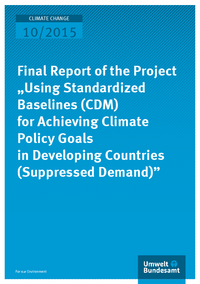
Standardised Baselines (SBs) shall improve the opportunities for least developed countries and other underrepresented regions to participate in the Clean Development Mechanism (CDM). SBs allow for shifting the effort of developing baseline scenarios and additionality testing from the individual project to the sectoral level.
This research project followed two separate approaches in order to gather experiences with the development of SBs and to contribute to the advancement of the SB regulatory framework. Under the first approach, an SB for rural electrification in Ethiopia was developed in cooperation with the Ethiopian Designated National Authority, which submitted the SB to the UNFCCC Secretariat. This SB for the first time incorporates the concept of ‘supressed demand’, i.e. demand that does not exist due to a lack of economic development.
In the second part of the project, a scoping study assesses how SBs can be developed to cover complex integrated production processes. The Indonesian cement sector was chosen as case for this study. To date, the SB framework does not provide explicit guidance on how to methodologically unpack complex production processes adequately. Three scenarios were developed that differ in the level of detail to which sub-processes of the production are considered for individual benchmarks on the basis of which a combined benchmark emission factor is calculated.
Arens, C., Hermwille, L., Burian, M.: Final Report of the Project „Using Standardized Baselines (CDM) for Achieving Climate Policy Goals in Developing Countries (Suppressed Demand)”. Wuppertal Institute for Climate, Environment and Energy & GFA Consulting Group. Wuppertal/Hamburg - 36 p.
Date:
June 2015
Cookie Settings
Marketing-Cookies werden von Drittanbietern oder Publishern verwendet, um personalisierte Werbung anzuzeigen. Sie tun dies, indem sie Besucher über Websites hinweg verfolgen.
Provider:
Statistik Cookies
Statistik-Cookies dienen der Analyse und helfen uns dabei zu verstehen, wie Besucher mit unserer Website interagieren, indem Informationen anonymisiert gesammelt werden. Auf Basis dieser Informationen können wir unsere Website für Sie weiter verbessern und optimieren.
Provider:
Erforderliche Cookies
Erforderliche Cookies sind für den reibungslosen Betrieb der Website zuständig, indem sie Kernfunktionalitäten ermöglichen, ohne die unsere Website nicht richtig funktioniert. Diese Cookies können nur über Ihre Browser-Einstellungen deaktiviert werden.
Provider: